
Set the example of a healthy eating style
Good eating habits that start in childhood can carry on throughout life. When children are young, teach them the importance of eating balanced meals, choosing nutritious foods and staying physically active. This can help them achieve a positive body image, maintain a healthy weight and ward off chronic diseases such as diabetes, heart disease and cancer. Here are some dos and don’ts for raising healthy eaters.
The Dos
DO practice flexibility. The less fuss you make over meal time, the more relaxed it will be. Your children’s eating habits will develop best if you let them decide how much food to eat based on the healthy choices that you offer.
DO make every bite count. If your children don’t have large appetites or only eat a small variety of foods, choose items that offer lots of nutritional value in every bite. For example, offer fibre-rich cereals instead of refined options.
DO dine together as a family. Use mealtime to talk, share and learn from each other. Studies show that children who routinely dine with their parents are more likely to eat fruits and vegetables, and are less likely to snack on unhealthy foods, smoke or drink alcohol.
DO offer vegetables and fruit at each meal, even if your children don’t eat them. Children may have to try a food up to 15 times before they decide if they like it. Knowing that broccoli is a constant presence and seeing you enjoy it will make them more apt to eat it too.
DO offer foods that are rich in DHA, a type of healthy omega-3 fat. Studies show that DHA helps with the normal development of the brain, eyes and nerves, and many Canadian children are falling short of this nutrient. It is found in salmon, trout, enriched eggs and fortified dairy products such as Neilson Dairy Oh! milk and Dairyland Li’L Ones yogurt.
DO act as a role model. Children will learn to eat what you eat, simply by watching and observing. If your diet is laden with fast food, soda pop and few vegetables, your children will learn these patterns. Make better choices and your children will too.
The Don’ts
DON’T worry about picky eaters. These habits are common in childhood and are usually short-lived. As long as children are not losing weight, picky eating is not cause for concern. Try to stay calm during eating jags – parents who don’t make a big deal about pickiness tend to have the easiest time dealing with it.
DON’T force children to clear their plates. Children are born with the amazing ability to know when they are hungry and when they are full. If you force-feed them, they will learn to overeat and will ignore their fullness cues, which can lead to obesity.
DON’T reward or bribe your children with junk food. Food provides essential nourishment and satisfies hunger, and children should understand this role. If “junk food” is only used to compliment good behaviour or get you out of tough situations (“if you stop crying, I’ll buy you a chocolate bar”), your children will learn this role instead.
DON’T pressure your children to eat certain foods. The more a parent pushes, the less likely children are to eat the food that’s being pushed. And remember, you probably prefer certain foods over others, so it only makes sense that your children have preferences too.
DON’T try to push healthy eating during a birthday party. If your children won’t eat carrot sticks at home, they sure won’t eat them while their friends are whirring and laughing around them. A bouncy castle or climbing gym can’t compete with a platter of fruit, so save the healthy eating plans for your home turf. When children are distracted by fun and frivolity, eating is the last thing on their minds.
DON’T eat while watching TV. If you dine while distracted, you miss out on important family time. Plus, your whole family could overeat since they are more focussed on the TV show than their true appetite.





